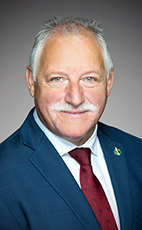Madam Speaker, I am extremely happy to rise today to speak to Bill C-26, the legislation that deals with proposed changes to the CPP. I am also happy because this is another initiative that our government has brought forward after committing to it prior to the election, and one that we continue to work on.
I want to thank our Prime Minister and our Minister of Finance for not wavering on this issue. This is an important initiative that needed the support of the provinces and territories, which we were able to successfully get.
When we talk about CPP we think about our seniors, but this is also about our youth, because over time they will become seniors. Time goes by quickly. When our youth start in the workplace they do not have any of the benefits that our generation had. The private sector chooses not to invest in the Canada pension plan, so our young people do not really have a guarantee at the end.
We want our seniors to be able to retire with respect and dignity. We want them to be able to live the golden years they worked for all of their lives. However, it is going to be difficult for our youth to do the same, because when they become seniors, there will be no pension funds available for them.
There is also the question of those who are going to soon reach the “senior age”, if I may use that term. Information from the Department of Finance in 2012 indicated that about 24% of individuals who were soon to retire were not saving enough to make sure they could continue their existing standard of living while working. That is a challenge as well.
I should add that Canadians live longer, and everyone is happy with that. I sure am. However, with that comes the need for people to save more, which can be a challenge for some individuals. By proposing changes to the Canada pension plan, the government is putting some protections in place to allow future seniors to retire in a much better way.
I would like to briefly outline what is being put in place with the provinces' agreement. This process will begin in 2019 and end approximately seven years later. The investments will be modest at first, but will increase over the seven years. The money invested will increase benefits from 25% to 33%, which is huge. In 2025, a person who is now earning an average salary of $50,000 will have $4,000 more for their pension. That is a sizeable increase.
The other important aspect is that those who retire and have a lower income will be able to benefit from the gains without contributing more. By the end of this initiative, the pension amount will have increased by 50%.
This means that people who receive $13,100 today could receive up to $20,000, which is a dramatic increase. That is a good example of a government that is working closely with the provinces and territories to ensure that Canadians will benefit more fully.
It also shows our government is proactive. We are not sitting back and risking that times will be really tough and Canadians will not have something with which to retire. We are being proactive.
Let us look at other jurisdictions. Let us talk about the U.S., for example. The social welfare programs could be somewhat in danger. I am quoting from what I believe is called the American social security program that is projecting that the benefits Americans are receiving now when they are retiring will not be guaranteed to still be there in 2033. That could be devastating for Americans, today and in the future and for future generations. That is extremely dangerous.
There is no question that our government is taking a proactive approach to this, and I believe this is a shining example of working together with the provinces and the territories. I believe this is what I would call true federalism, where people, communities, and governments are coming together to put in place an initiative that would make life better for Canadians in the future.
This is not the only initiative that our government has put forward. When we were first elected, the first main initiative we put in place was the 7% tax reduction for Canadians. On top of that, we were the only ones who were willing to and who did put an increase on income tax for the wealthiest Canadians. That was a major initiative that our government put in place.
The second one, which we know—and as I travel across my riding, seniors and Canadians who will retire soon share that—is the fact that the age for OAS was returned to 65 years old. Canadians are extremely happy that they do not have to work those extra two years. That is another major initiative that our government brought forward.
There are all kinds of those. We can look at the budget. The 2016 budget focused on the child care benefit. That child care benefit program, while I was campaigning, was the most important thing.
We are saying Canada needs more people. We want immigrants, we want refugees, and we also want to have more kids, young families; so we need to support them, and we are supporting them with that major initiative of the child care benefit.
The infrastructure investment will create jobs and create foreign investment. Those are initiatives that will be very positive.
I have to say in closing that I am extremely happy with this initiative. I know that the people in my riding will be extremely happy with this, and I also know that Canadians will be happy. This is the Canadian way of doing business, and it is how government should work, working together for the betterment of all Canadians.

